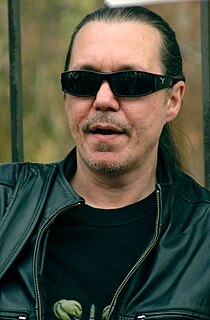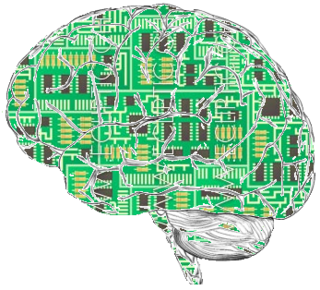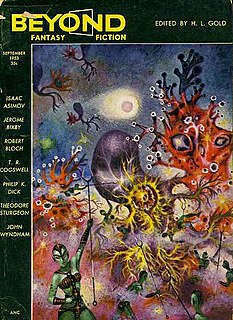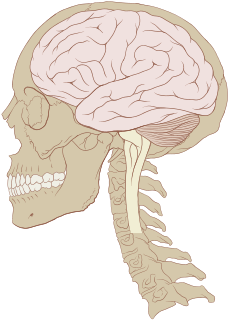External links
- Wild Minds title listing at the Internet Speculative Fiction Database
| Wild Minds | |
|---|---|
| by Michael Swanwick | |
| Language | English |
| Genre(s) | science fiction short story |
| Published in | Asimov's Science Fiction |
| Publication type | Magazine |
| Publication date | May 1998 |
"Wild Minds" is a science fiction short story published in 1998 by Michael Swanwick. It was nominated for the 1999 Hugo Award for Best Short Story. [1]
The story follows Thom, a Catholic man who refuses to get his brain "optimized." After meeting Hellene, an HR representative from Prague who does have an optimized brain, he brings her back to his place for a visit. She tries to convince him of the benefits of optimization, and he explain the reasons he hasn’t done it.

Brian Wilson Aldiss was an English writer, artist, and anthology editor, best known for science fiction novels and short stories. His byline reads either Brian W. Aldiss or simply Brian Aldiss, except for occasional pseudonyms during the mid-1960s.

George Raymond Richard Martin, also known as GRRM, is an American novelist, screenwriter, television producer and short story writer. He is the author of the series of epic fantasy novels A Song of Ice and Fire, which were adapted into the Emmy Award-winning HBO series Game of Thrones (2011–2019) and its prequel series House of the Dragon (2022–present). He also helped create the Wild Cards anthology series, and contributed worldbuilding for the 2022 video game Elden Ring.

Howard Waldrop is a science fiction author who works primarily in short fiction. He received the World Fantasy Award for Life Achievement in 2021.
A brain transplant or whole-body transplant is a procedure in which the brain of one organism is transplanted into the body of another organism. It is a procedure distinct from head transplantation, which involves transferring the entire head to a new body, as opposed to the brain only. Theoretically, a person with advanced organ failure could be given a new and functional body while keeping their own personality, memories, and consciousness through such a procedure. Neurosurgeon Robert J. White has grafted the head of a monkey onto the headless body of another monkey. EEG readings showed the brain was later functioning normally. Initially, it was thought to prove that the brain was an immunologically privileged organ, as the host's immune system did not attack it at first, but immunorejection caused the monkey to die after nine days. Brain transplants and similar concepts have also been explored in various forms of science fiction.
In American science fiction of the 1950s and '60s, psionics was a proposed discipline that applied principles of engineering to the study of paranormal or psychic phenomena, such as telepathy and psychokinesis. The term is a portmanteau formed from psi and the -onics from electronics. The word "psionics" began as, and always remained, a term of art within the science fiction community and—despite the promotional efforts of editor John W. Campbell, Jr—it never achieved general currency, even among academic parapsychologists. In the years after the term was coined in 1951, it became increasingly evident that no scientific evidence supports the existence of "psionic" abilities.

David Rowland Langford is a British author, editor, and critic, largely active within the science fiction field. He publishes the science fiction fanzine and newsletter Ansible, and holds the all-time record for most Hugo Awards, with a total of 29 wins.

Gordon Randall Phillip David Garrett was an American science fiction and fantasy author. He was a contributor to Astounding and other science fiction magazines of the 1950s and 1960s. He instructed Robert Silverberg in the techniques of selling large quantities of action-adventure science fiction, and collaborated with him on two novels about men from Earth disrupting a peaceful agrarian civilization on an alien planet.
"Rautavaara's Case" is a science fiction short story by American writer Philip K. Dick. It was first published in 1980 in Omni magazine and subsequently in the 1985 short story collection I Hope I Shall Arrive Soon. The story was also included on We Can Remember It For You Wholesale, volume five of the Collected Short Stories of Philip K. Dick in 2003.

Edward Winslow Bryant Jr. was an American science fiction and horror writer sometimes associated with the Dangerous Visions series of anthologies that bolstered The New Wave. At the time of his death, he resided in North Denver.

David J. Schow is an American author of horror novels, short stories, and screenplays. His credits include films such as Leatherface: The Texas Chainsaw Massacre III, The Crow and The Hills Run Red. Most of Schow's work falls into the subgenre splatterpunk, a term he is sometimes credited with coining. In the 1990s, Schow wrote Raving & Drooling, a regular column for Fangoria magazine. All 41 installments were collected in the book Wild Hairs (2000), winning the International Horror Guild's award for best non-fiction in 2001.

Mind uploading, whole brain emulation, or substrate-independent minds, is a use of a computer or another substrate as an emulated human brain. The term "mind transfer" also refers to a hypothetical transfer of a mind from one biological brain to another. Uploaded minds and societies of minds, often in simulated realities, are recurring themes in science-fiction novels and films since the 1950s.

Bruce Holland Rogers is an American author of short fiction who also writes under the pseudonym Hanovi Braddock. His stories have won a Pushcart Prize, two Nebula Awards, the Bram Stoker Award, two World Fantasy Awards, the Micro Award, and have been nominated for the Edgar Allan Poe Award and Spain's Premio Ignotus.
"Robot Dreams" is a science fiction short story by American writer Isaac Asimov exploring the unbalance of robot/human relationships under Asimov's Three Laws of Robotics. It was nominated for a Hugo Award in 1987. It won the Locus Award for Best Short Story in 1987. "Robot Dreams", along with 20 other short stories by Asimov, was published in Robot Dreams in 1986 by Berkley Books.

"Kid Stuff" is a science fiction short story by American writer Isaac Asimov. It was first published in the September 1953 issue of Beyond Fantasy Fiction and reprinted in the 1957 collection Earth Is Room Enough. Asimov wrote the story in January 1953, intending it for a new magazine called Fantastic, but it was rejected by its editor, Harold Browne. Asimov then submitted it to H. L. Gold, who accepted it for a new sister magazine of Galaxy Science Fiction called Beyond Fantasy Fiction.

"Goat Song" is a science fiction novelette by American writer Poul Anderson. Originally published in The Magazine of Fantasy and Science Fiction issue of February 1972, it was later included in the anthologies Nebula Award Stories Eight and The Hugo Winners Volume 3, as well as in Anderson's collection Homeward and Beyond.

The 10 percent of the brain myth asserts that humans generally use only 10 percent of their brains. It has been misattributed to many celebrated people, notably Albert Einstein. By extrapolation, it is suggested that a person may harness this unused potential and increase intelligence.
A mindwipe is a fictional memory erasure procedure in which the subject's memories and sometimes personality are erased. Often those are replaced by new memories more useful to those who are carrying out the mindwiping. It is a more thorough form of brainwashing. It is sometimes used as an alternative to capital punishment, or to make the subject more useful to the system. The mindwipe can be performed by a hypnotic or magical ability, or by an electronic device. It is often coupled with stories where the characters have amnesia, although the latter concept includes cases that occur naturally or by accident instead of the result of a deliberate procedure.
Richard Edward Wormser was an American writer of pulp fiction, detective fiction, screenplays, and Westerns, some of it written using the pseudonym of Ed Friend. He is estimated to have written 300 short stories, 200 novelettes, 12 books, many screenplays and stories turned into screenplays, and a cookbook: Southwest Cookery or At Home on the Range.
"BLIT" is a 1988 science fiction short story by the British writer David Langford.

Shankar Vedantam is an American journalist, writer, and science correspondent. His reporting focuses on human behavior and the social sciences. He is best known for his Hidden Brain family of products: book, podcast, and radio program.